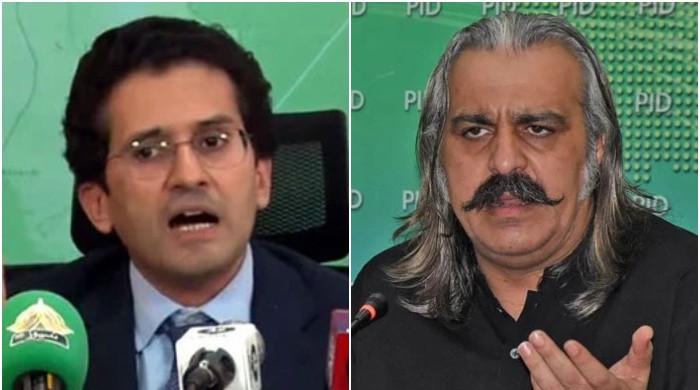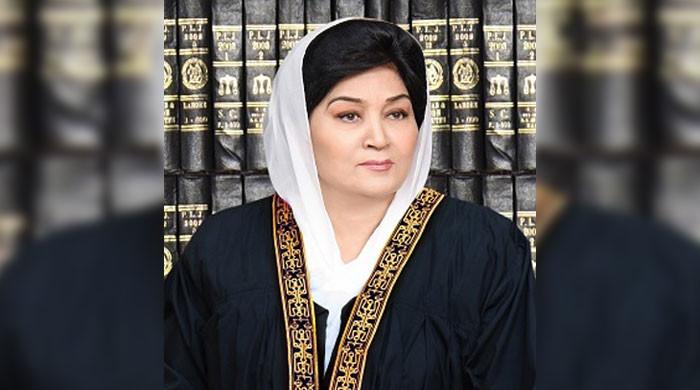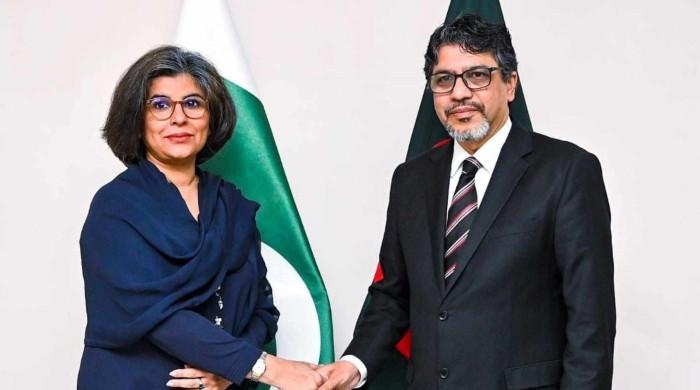We want a Pakistan where foreign investors feel safe, secure: PM
DAVOS: Prime Minister Nawaz Sharif on Friday invited the Swiss and other international investors to Pakistan's energy, telecom, infrastructure, urban development, agro-industry and textiles...
January 23, 2016

DAVOS: Prime Minister Nawaz Sharif on Friday invited the Swiss and other international investors to Pakistan's energy, telecom, infrastructure, urban development, agro-industry and textiles sectors that offer exciting opportunities for investment.
"I invite you to be our partners in realising our vision for Pakistan. Our vision is of a Pakistan which is business friendly; a Pakistan where foreign investors feel safe and secure; and a Pakistan which is modern, progressive and forward-looking," he told a group of investors here at a breakfast meeting, hosted by Ikram Sehgal, Chairman of the Pathfinder Group on "Pakistan - A land of Business Opportunities."
"I assure you that my business-friendly government will extend all possible assistance to you in your business endeavours in Pakistan," the prime minister said as he shared with the gathering the country's greatly improved internal security situation, and robust economic indicators.
Finance Minister Ishaq Dar, Commerce Minister Engineer Khurram Dastgir, Special Assistant to PM on Foreign Affairs Tariq Fatemi and Miftah Ismail attended the meeting along with around a hundred participants of the World Economic Forum.
The prime minister said investment incentives in Pakistan were diverse and business friendly. "Our primary objective is to create an environment conducive for investment inflows. We offer a liberal investment policy, which includes 100 percent equity ownership, full repatriation of capital, tax-breaks, and customs duty concessions on import of machinery and raw materials," Nawaz Sharif told the investors.
"We offer prospects of co-production, joint ventures with local partners and joint marketing arrangements. The taxation regime is one of the lowest in the region and its collection is undertaken through a dedicated Large Taxpayers Unit. A multiplicity of tax concessions is available along with provisions of tax exemptions to specific businesses," he said.
Prime Minister Nawaz Sharif told the investors gathered in the Swiss town for the 46th World Economic Forum that Pakistan's economic upturn was now being acknowledged and appreciated worldwide.
"Leading international publications, funds managers and rating agencies have made positive assessments of our economic turnaround," he added. He said Pakistan was home to the sixth largest population in the world with 180 million people. He said Pakistan has the 26th largest economy by purchasing power parity, 44th largest economy by real Gross Domestic Product and the 10th largest country in the world, according to the size of its labour force.
"With a thriving democracy, sound economic policies, a youthful population, abundant natural resources and its strategic location, Pakistan is poised to emerge as an economic powerhouse in the region. We are promoting accountable, responsible and transparent governance, bolstered by a free media, independent judiciary and a vibrant civil society."
Nawaz Sharif said his government was committed to effectively tackling the whole range of economic, security and energy related challenges confronting Pakistan today.
He mentioned that a comprehensive National Action Plan to combat terrorism was being implemented. He said the plan provides for a multi-pronged strategy, combining military action, law enforcement operations, choking terrorist financing and countering the extremist narrative.
He said it has led to a significant improvement in the security situation and to a peaceful and stable environment wherein businesses can grow and flourish.
The prime minister said his government has adopted a comprehensive agenda for real change to transform Pakistan into a favoured destination for business, trade and investment.
"The Pakistan of 2016 is a confident and safe country, open for business, trade and investment. We assure you of ease of business and healthy dividends on your investments in Pakistan," he added.
He also informed the gathering that his government had launched `Vision Pakistan 2025', at the national level which, he added, puts people's economic development first.
The prime minister also shared some of the measures that his government has taken to set the country on the trajectory of inclusive growth and jobs creation.
He said these include wide-ranging economic structural reforms aimed at ensuring sound macroeconomic policies to reduce budgetary deficits, curb inflation and enhance self-reliance.
He said the government was also carrying forward a process of privatisation through strategic partnerships in the state-owned enterprises.
He said through a wide range of policy measures, his government was transforming human capital into a driver for growth and development.
"Nearly sixty percent of our population is under the age of thirty, thus offering huge demographic dividends," he said, and mentioned his government's internship programme to pay college students.
He also mentioned the loans programme for the youth to help them start small businesses and provide employment to others.
The prime minister said his government was committed to providing women greater access to education, economic resources, and employment opportunities, to enable them to become equal partners in economic development.
He said the development expenditure has been more than doubled in third fiscal year 2016 and special focus has been given on the social safety net expenditure to help the vulnerable population.
He said budgetary allocations for this purpose have been gradually enhanced to over 300 percent of the baseline of Fiscal Year 2013, with 50 percent increase in the cash income support and over 60 percent increase in the number of families covered under this programme.
The prime minister said his government has particularly focused on key areas of the energy sector, regional connectivity, and promotion of investment.
"We are taking steps to strengthen the energy sector, including through increase in power generation, use of better technology in power distribution, controlling line losses, energy conservation, and diversifying the energy mix," he said.
Nawaz Sharif mentioned the increase in the well-head prices of oil and gas for the exploration companies and said it has led to renewed interest in exploration activities. He said new terminals and pipelines were being laid to import natural gas for homes and industries. He said his government was adding to the electricity generation capacity of the country by about 10,000 MW in the next two years.
He said active progress was underway on an additional 14,000 MW approximately beyond Fiscal Year 2018.
The prime minister said one of the key pillars of his government's policy were to support and encourage greater regional integration and connectivity. "This is where we have our biggest opportunities to reap the dividends of peace for the common good of our peoples," he said.
He said his government has devised a policy to integrate the region through trade and economic corridors as he strongly believes that real prosperity was `shared' prosperity. "Given our geo-strategic location, we are well placed to act as the prime movers for promoting regional connectivity," he said.
He also shared with the investors the scale and number of regional projects launched recently and said these include the China-Pakistan Economic Corridor (CPEC), the Turkmenistan-Afghanistan-Pakistan-India (TAPI) gas pipeline, the Central Asia-South Asia (CASA) 1000 electricity project, and the Torkham-Jalalabad Road. He said the CPEC embraces multiple infrastructure and development projects, including road infrastructure, energy generation and transmission, development of Gwadar Port, upgrading of railways infrastructure, development of industrial and commercial zones, and medium- and long-term planning for the country's core economic sectors.
The first phase of CPEC projects is estimated to bring in an investment of $46 billion, primarily in the energy and the road and rail infrastructure sectors. He said this mega project will serve as a "game-changer" in ushering in a new era of peace, cooperation and development in the region and beyond, as it envisages building advanced infrastructure, energy and communication networks, linking the western regions of China with Pakistan.
"I am confident that the CPEC would revolutionise trade and investment in the region."
The prime minister said Pakistan has already started to reap the dividends of the measures taken by his government and said country's GDP has grown by 4.24 % in Fiscal Year 2015, the highest in the last seven years. Inflation was at 4.6% in the same year, and in the first half of the Current Fiscal Year, was at a historic low of around 2%.
"Our per capita income has risen by 12.91% in the first two years of our government. Budget deficit has been brought down from the projected 8.8% for Fiscal Year 2013 to 5.3% in Fiscal Year 2015, and is projected to be further brought down to 4.3% in Current Fiscal Year 2016."
He said in the first two fiscal years, tax revenues have increased by over 33%, due to tax-net broadening and removal of special exemptions, while the medium-term plan was to increase tax-to-GDP ratio from 8.6% in Fiscal Year 2013 to around 13% by Fiscal Year 2018.
Nawaz Sharif said Pakistan's three stock exchanges had been merged into the Pakistan Stock Exchange (PSE) and pointed out that Karachi Stock Exchange Index, which stood at 19,916 in May 2013 at the time of the General Election 2013, has now surged to over 30,000.
He said the PSE has shown greater stability as compared to other regional markets in the recent stock market turmoil.
Prime Minister Nawaz Sharif said he believed that future prosperity and economic development was largely linked with peace and security in the region.
"Peace is vital to development and development is essential for durable peace," he said and added: "Building a peaceful neighbourhood is central to the realisation of Pakistan's vision for regional peace and economic prosperity."
"It is this philosophy that underpins our outreach efforts to our immediate neighbours," he added.
Nawaz Sharif said Pakistan desires to forge cooperative relations with India, in the interest of the peoples of the two countries and of the region.
"We believe that dialogue is the only way forward to resolve the outstanding issues between our two countries, which would pave the way for fully realising the tremendous growth potential of South Asia."
He said Pakistan responded promptly and positively in welcoming the brief stop-over by Indian Prime Minister Modi to Pakistan on December 25.
Mentioning bilateral ties with Afghanistan, he said Pakistan was sincerely committed to peace and stability in its western neighbour, and mentioned the co-hosting with Afghanistan, the fifth Ministerial Conference of the Heart of Asia-Istanbul Process with the theme "Enhanced Cooperation for Countering Security Threats and Promoting Connectivity in the Heart of Asia Region" in Islamabad.
"Pakistan is supporting various reconstruction and development projects in Afghanistan. We also wish the international community to remain engaged in supporting Afghanistan's reconstruction and economic development.
"We also remain committed to the full implementation of the Afghan-Pakistan Transit Trade Agreement. We are willing to expand its coverage to include other Central Asian States," he said.
The prime minister expressed gratitude to the Pathfinder Group and Ikram Sehgal for hosting the important event with prominent business leaders, intellectuals, academics and diplomats. He said the Pathfinder Group has been a leader in fostering a series of informed dialogues on international issues. - Originally published in TheNews











